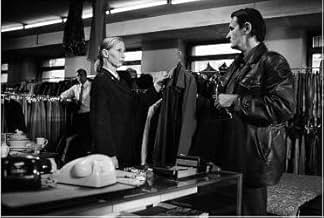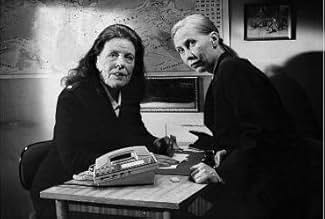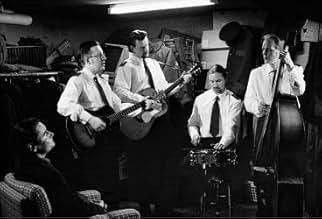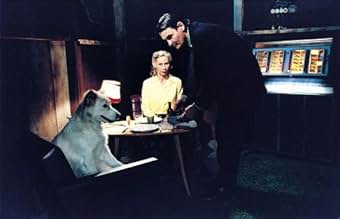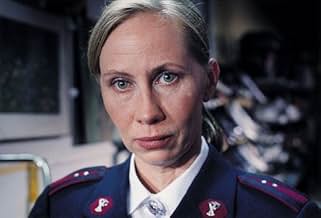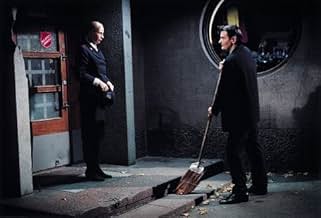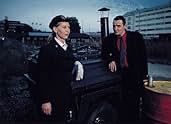IMDb RATING
7.6/10
28K
YOUR RATING
M arrives in Helsinki only to be viciously attacked by thugs and pronounced dead by medics. He revives but with no memory of his past or his identity. He rebuilds his life from scratch, but ... Read allM arrives in Helsinki only to be viciously attacked by thugs and pronounced dead by medics. He revives but with no memory of his past or his identity. He rebuilds his life from scratch, but the past inevitably catches up with him.M arrives in Helsinki only to be viciously attacked by thugs and pronounced dead by medics. He revives but with no memory of his past or his identity. He rebuilds his life from scratch, but the past inevitably catches up with him.
- Nominated for 1 Oscar
- 21 wins & 27 nominations total
- Director
- Writer
- All cast & crew
- Production, box office & more at IMDbPro
Featured reviews
MAN WITHOUT A PAST, THE (Aki Kaurismäki - Finland/France/Germany 2002).
This second installment in Aki Kaurismaki's projected "Finland Trilogy" is a heart-warming fable about a man (Markku Peltola) who loses everything, including his identity. After M, as he is referred to for the rest of the film, dozes off on a park bench, he is awoken by a trio of thugs who brutally beat him up, steal his money and toss his wallet and identity papers into the trash bin. In the hospital, he is pronounced dead by the doctors, but by some miracle he springs back to life but with no memory whatsoever of his past or his identity. Now a penniless amnesiac, he has to build his life from scratch. Without knowing a single person (and without a single person knowing him), he must try to survive, but he soon acquires a melancholy dog named Hannibal and falls in love with Irma, a lonely salvation army soup kitchen volunteer. Of course, his past does catch up with him, but it only works to point out what's really important in his future life.
Kaurismäki usually champions the outcasts of society and here it's no different. He once said: "I make films for the unemployed, but since they don't have money to buy cinema tickets I generally have no audience." Of course, Kaurismäki has a huge audience by now, but no matter how simple and accessible the story in the film might look, he still manages to blend romance, quirky comedy and social commentary, seemingly effortless into the film's narrative.
Most of the humor doesn't come from any written gags or jokes but springs from the absurdity of the situations, all in Kaurismäki's typical deadpan-comedy style, complete with nods top '50s B-movies, rock'n'roll ("rhytm music", as it's called by M), fairytale romance and an incomparable soundtrack, featuring British beat combo, The Renegades. I just love the music in this film! Time and place hover between Helsinki in the '30s and the present. Despite the idiosyncratic set-up and the strange unreal dialog, it's incredible how very real all these characters feel. Deep sentiment but every inch of it sincere. I can't get enough of this film, no matter how often I've seen it.
Camera Obscura --- 9/10
This second installment in Aki Kaurismaki's projected "Finland Trilogy" is a heart-warming fable about a man (Markku Peltola) who loses everything, including his identity. After M, as he is referred to for the rest of the film, dozes off on a park bench, he is awoken by a trio of thugs who brutally beat him up, steal his money and toss his wallet and identity papers into the trash bin. In the hospital, he is pronounced dead by the doctors, but by some miracle he springs back to life but with no memory whatsoever of his past or his identity. Now a penniless amnesiac, he has to build his life from scratch. Without knowing a single person (and without a single person knowing him), he must try to survive, but he soon acquires a melancholy dog named Hannibal and falls in love with Irma, a lonely salvation army soup kitchen volunteer. Of course, his past does catch up with him, but it only works to point out what's really important in his future life.
Kaurismäki usually champions the outcasts of society and here it's no different. He once said: "I make films for the unemployed, but since they don't have money to buy cinema tickets I generally have no audience." Of course, Kaurismäki has a huge audience by now, but no matter how simple and accessible the story in the film might look, he still manages to blend romance, quirky comedy and social commentary, seemingly effortless into the film's narrative.
Most of the humor doesn't come from any written gags or jokes but springs from the absurdity of the situations, all in Kaurismäki's typical deadpan-comedy style, complete with nods top '50s B-movies, rock'n'roll ("rhytm music", as it's called by M), fairytale romance and an incomparable soundtrack, featuring British beat combo, The Renegades. I just love the music in this film! Time and place hover between Helsinki in the '30s and the present. Despite the idiosyncratic set-up and the strange unreal dialog, it's incredible how very real all these characters feel. Deep sentiment but every inch of it sincere. I can't get enough of this film, no matter how often I've seen it.
Camera Obscura --- 9/10
I am not familiar at all with the work of this director at all so I was unsure what to expect from this movie when seeing it as part of the Regus London Film Festival on tour.
I needn't have worried. This film is very touching and in many places laugh out loud funny. The scene where the dog is introduced is just side-splitting.
The humour is so dry and it is very hard to compare this film with many other films, but for some reason it reminded me a little of Jean-Pierre Jeunet's Delicatessen, especially some of the colours in the set design.
I understand this film is the second part of a trilogy? I simply have to see more stuff from this guy, I feel like I have missed out in a big, big way!
If you get the chance, don't hesitate to see this film, it is simply a work of art. I for one will be going to see it again when it goes on general release next year.
I needn't have worried. This film is very touching and in many places laugh out loud funny. The scene where the dog is introduced is just side-splitting.
The humour is so dry and it is very hard to compare this film with many other films, but for some reason it reminded me a little of Jean-Pierre Jeunet's Delicatessen, especially some of the colours in the set design.
I understand this film is the second part of a trilogy? I simply have to see more stuff from this guy, I feel like I have missed out in a big, big way!
If you get the chance, don't hesitate to see this film, it is simply a work of art. I for one will be going to see it again when it goes on general release next year.
The Man Without a Past, the second installment in Aki Kaurismäki's "losers" trilogy (the first being 1996's Drifting Clouds), is, to date, the only Finnish film to have received a Best Foreign Language Film Oscar nomination, and deservedly so. It's a wonderful, heartbreaking opus, and arguably Kaurismäki's finest movie.
At the story's center we find a nameless man (Markku Peltola), who arrives in Helsinki for unknown reasons. That same night, he's brutally assaulted by a group of punks. This incident makes him look dead, although we immediately learn he is alive, if completely amnesiac. With no idea of who he is or what he's supposed to do, he starts looking for a home and an employment. He manages to rent a "house" in the city outskirts (don't miss Sakari Kuosmanen as the landlord) and befriends Irma (Kati Outinen), a social worker who tries to help M (in lack of a better name, and given "X" is quite overused) as much as possible. It is this friendship, which slowly evolves into something deeper, that truly motivates the protagonist in his pursuit of a better life.
The Man Without a Past strikes us because, unlike other films involving amnesia, it makes us hope M won't recover his memory: what he experiences throughout the movie, the people he meets, that's what really matters. It's a little bit like a road movie (they never end with the characters reaching their destination), only this time the voyage involves the mind and the spirit. It's a similar voyage the director asks the audience to join, as he artfully explores human life and its chances of improvement.
Moving and reminiscent of Italian neorealism (De Sica, Rossellini, Visconti), The Man Without a Past is a flawless reflection on how happiness is to be found anywhere, no matter the circumstances.
At the story's center we find a nameless man (Markku Peltola), who arrives in Helsinki for unknown reasons. That same night, he's brutally assaulted by a group of punks. This incident makes him look dead, although we immediately learn he is alive, if completely amnesiac. With no idea of who he is or what he's supposed to do, he starts looking for a home and an employment. He manages to rent a "house" in the city outskirts (don't miss Sakari Kuosmanen as the landlord) and befriends Irma (Kati Outinen), a social worker who tries to help M (in lack of a better name, and given "X" is quite overused) as much as possible. It is this friendship, which slowly evolves into something deeper, that truly motivates the protagonist in his pursuit of a better life.
The Man Without a Past strikes us because, unlike other films involving amnesia, it makes us hope M won't recover his memory: what he experiences throughout the movie, the people he meets, that's what really matters. It's a little bit like a road movie (they never end with the characters reaching their destination), only this time the voyage involves the mind and the spirit. It's a similar voyage the director asks the audience to join, as he artfully explores human life and its chances of improvement.
Moving and reminiscent of Italian neorealism (De Sica, Rossellini, Visconti), The Man Without a Past is a flawless reflection on how happiness is to be found anywhere, no matter the circumstances.
10a2859289
Whoever has seen any of Aki Kaurismäki's films might agree that they are all but mainstream. Nevertheless, the story itself doesn't have to be too complicated. In this case, a man completely loses his past in a shockingly violent way, and he rediscovers life again in an environment of bums who sleep in containers. The good thing I found about this movie was: No romanticism of misery, no enlightenment of the tortured hero, no sob-stuff love story, no superfluous, aloof intellectualism at all. At least not in an obtrusive or overly serious way. But in a way that it sometimes shocked me , sometimes made me laugh, sometimes grin. I was never bored. And as I made it to Finland for the first time in my life a few weeks after seeing this movie - I found everything to be amazingly authentic.
A remarkable film that definitely moves into my shrine of the best 50!
A remarkable film that definitely moves into my shrine of the best 50!
This movie is deceptive--a casual viewing could discard it as another "feel good" film from Europe.
It permeates Christian values without sermons, priests, or any religious hard sell (a small poster of Christ in a booth of the Salvation Army is an exception). Philosophically, it presents Tabula Rasa or a clean slate to begin life anew. The film tends to be absurdist (not even a moan emanates from brutalized victims of violence, broken noses are twisted back painlessly, victims of violence emerge from shadows to mete out justice). The film recalls shades of the brilliance of Tomas Alea's early Cuban films and the humanity of Zoltan Fabri's Hungarian cinema.
The film presents entertainment of a kind that would be alien to Hollywood--a cinematic essay on human values that seem to be a rare commodity the world over. There is no sex; there is no need for it. The poor who live in garbage bins and in empty containers, are rich with pockets full of kindness, helping each other without any expectation of a reward. The rich and powerful (the ex-wife and her lover, the policemen, the hospital staff, the official who rents out illegal living space) seem bereft of true feelings or any human kindness. The poorer sections of society (the electrician, the restaurant staff, the family who nurses the main character, the Salvation Army staff) do good to others, care about others and expect nothing in return.
The film is an affirmation of Christian values without preaching religion. The main female character in love with the man, is ready to sacrifice her love because she genuinely respects marriage vows and even brings a "train" schedule to send off her lover to his wife. The art of giving is sanctified. A man who employed workers believes in paying his workers, even if it meant robbing a bank to do so. A lawyer argues a case well because he likes the Salvation Army. Symbolically, even half a potato among six or eight harvested is given away to some stranger wanting to eat it and avoid scurvy! Again, symbolically there is rain on a clear day to help grow the few potatoes...
The film provides humour of a quaint, Finnish variety. A timid dog that eats leftover peas is called Hannibal--a male name one can associate with a king or even the cannibalistic Hannibal Lecter--even though the dog is female. There are swipes taken against the government and its associated machinery (antiquated laws, North Korean buying Finnish banks, retirement benefits, strikes and strikers, bank staff, corrupt banking practices).
Trains play a crucial role in Kaurismaki's screenplay. It begins and ends the film. It also punctuates the film, when the past is revealed, briefly.
There are possible flaws in the film--the blue tint when the children spot the injured man. The unexplained Japanese dinner with Sake and Japanese music on the train. The significance of the cigar in the script is elusive. The choice of songs, however good, seem to be haphazard.
The script is otherwise brilliant. In glorifying the detritus of society, Kaurismaki seems to affirm there is indeed a link between the tree and falling dead leaf (with reference to a comment by a character in the movie). The train moves on. Forward, not backwards!
Minimizing the world into a man, a woman, a dog and trains, Kaurismaki serves a feast of observations for a sensitive mind--a tale told with a positive approach to move on and seize the day. It is a political film, an avant garde film, a comedy and a religious film, all lovingly bundled together by a marvelous cast.
Finland should thank Kaurismaki--he is her best ambassador. He makes the viewer love the Finns, warts and all!
It permeates Christian values without sermons, priests, or any religious hard sell (a small poster of Christ in a booth of the Salvation Army is an exception). Philosophically, it presents Tabula Rasa or a clean slate to begin life anew. The film tends to be absurdist (not even a moan emanates from brutalized victims of violence, broken noses are twisted back painlessly, victims of violence emerge from shadows to mete out justice). The film recalls shades of the brilliance of Tomas Alea's early Cuban films and the humanity of Zoltan Fabri's Hungarian cinema.
The film presents entertainment of a kind that would be alien to Hollywood--a cinematic essay on human values that seem to be a rare commodity the world over. There is no sex; there is no need for it. The poor who live in garbage bins and in empty containers, are rich with pockets full of kindness, helping each other without any expectation of a reward. The rich and powerful (the ex-wife and her lover, the policemen, the hospital staff, the official who rents out illegal living space) seem bereft of true feelings or any human kindness. The poorer sections of society (the electrician, the restaurant staff, the family who nurses the main character, the Salvation Army staff) do good to others, care about others and expect nothing in return.
The film is an affirmation of Christian values without preaching religion. The main female character in love with the man, is ready to sacrifice her love because she genuinely respects marriage vows and even brings a "train" schedule to send off her lover to his wife. The art of giving is sanctified. A man who employed workers believes in paying his workers, even if it meant robbing a bank to do so. A lawyer argues a case well because he likes the Salvation Army. Symbolically, even half a potato among six or eight harvested is given away to some stranger wanting to eat it and avoid scurvy! Again, symbolically there is rain on a clear day to help grow the few potatoes...
The film provides humour of a quaint, Finnish variety. A timid dog that eats leftover peas is called Hannibal--a male name one can associate with a king or even the cannibalistic Hannibal Lecter--even though the dog is female. There are swipes taken against the government and its associated machinery (antiquated laws, North Korean buying Finnish banks, retirement benefits, strikes and strikers, bank staff, corrupt banking practices).
Trains play a crucial role in Kaurismaki's screenplay. It begins and ends the film. It also punctuates the film, when the past is revealed, briefly.
There are possible flaws in the film--the blue tint when the children spot the injured man. The unexplained Japanese dinner with Sake and Japanese music on the train. The significance of the cigar in the script is elusive. The choice of songs, however good, seem to be haphazard.
The script is otherwise brilliant. In glorifying the detritus of society, Kaurismaki seems to affirm there is indeed a link between the tree and falling dead leaf (with reference to a comment by a character in the movie). The train moves on. Forward, not backwards!
Minimizing the world into a man, a woman, a dog and trains, Kaurismaki serves a feast of observations for a sensitive mind--a tale told with a positive approach to move on and seize the day. It is a political film, an avant garde film, a comedy and a religious film, all lovingly bundled together by a marvelous cast.
Finland should thank Kaurismaki--he is her best ambassador. He makes the viewer love the Finns, warts and all!
Did you know
- TriviaIn the bar scene there is a portrait photo of Matti Pellonpää on the wall. He played in numerous Kaurismäki films before his sudden death in 1995.
- GoofsThe Helsinki railway station's extension roof is clearly visible at the opening scene, but it hadn't been built yet in 1996 (the year can be read from the newspaper).
- ConnectionsFeatured in Matka suomalaiseen elokuvaan: Naurua pimeässä (2006)
- SoundtracksDo The Shake
Performed by The Renegades
Music & Lyrics by Brown / Gibson / Johnson / Mallett
Published by Warner / Chappell Music Finland
(P) 1964 Scandia / Warner Music Finland
Licensed courtesy of Warner Music Finland
- How long is The Man Without a Past?Powered by Alexa
Details
- Release date
- Countries of origin
- Official sites
- Language
- Also known as
- The Man Without a Past
- Filming locations
- Production companies
- See more company credits at IMDbPro
Box office
- Budget
- FIM 8,000,000 (estimated)
- Gross US & Canada
- $921,847
- Opening weekend US & Canada
- $23,281
- Apr 6, 2003
- Gross worldwide
- $9,564,237
- Runtime1 hour 37 minutes
- Color
- Sound mix
- Aspect ratio
- 1.85 : 1
Contribute to this page
Suggest an edit or add missing content







